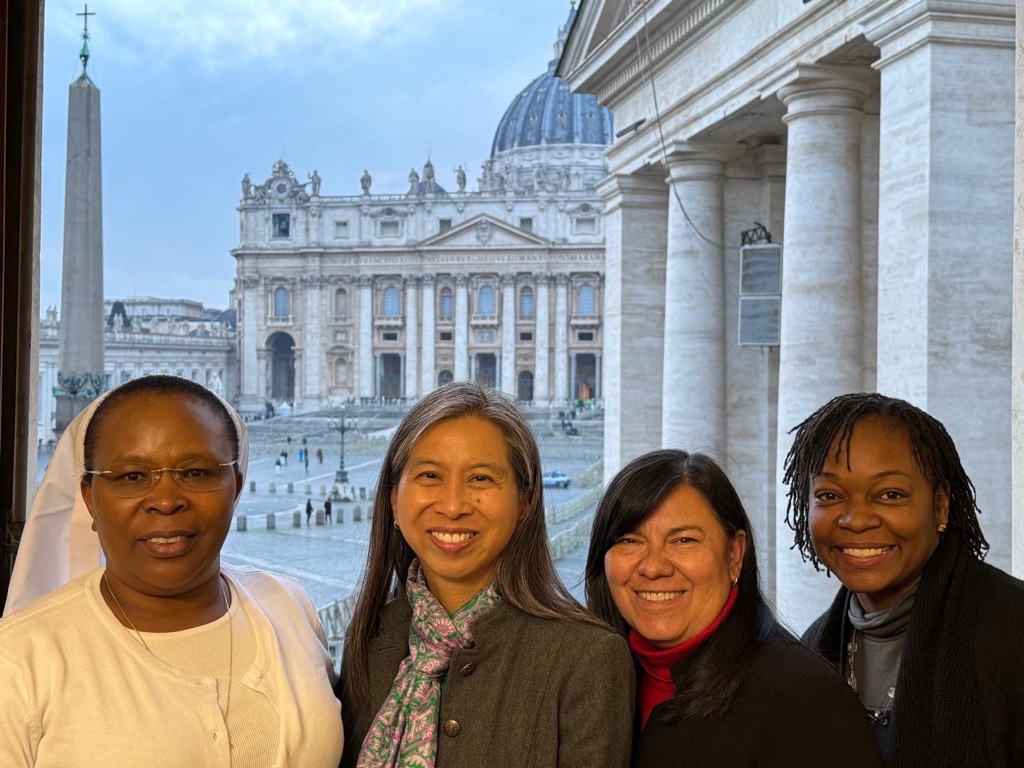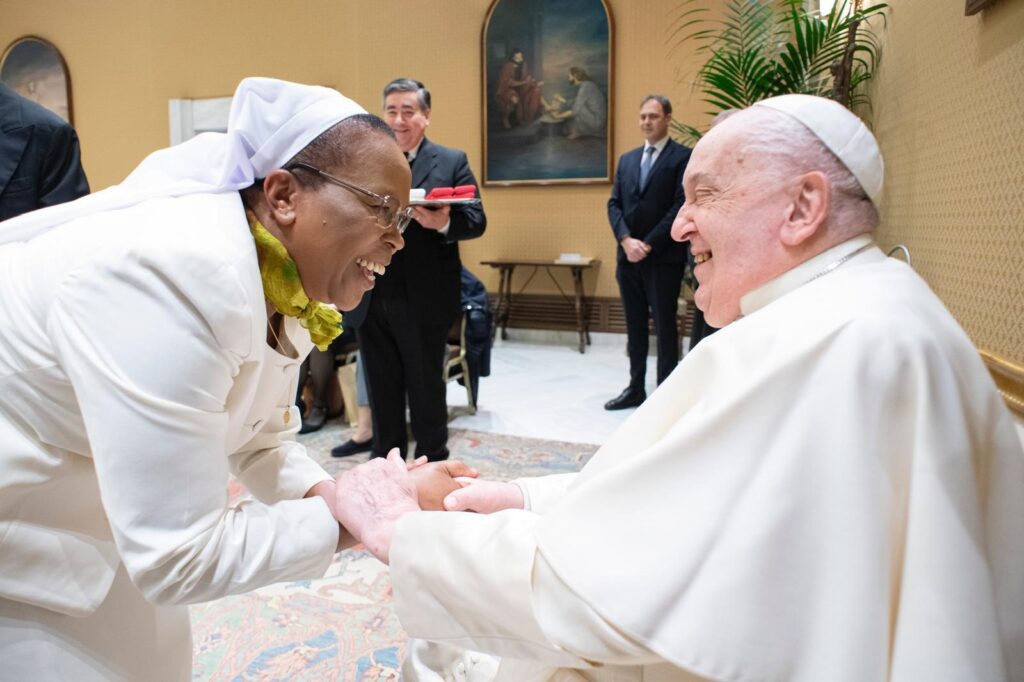Sister Jane Wakahiu was attending the International Union of Superiors General (UISG) Plenary Assembly in Rome when the world learned that Pope Leo XIV would lead the Catholic Church. The Hilton Foundation’s communications team recently sat down with Sr. Jane for a conversation about this historic moment.
Can you describe how you felt upon learning the identity of the new pope?
I am thrilled we have Pope Leo XIV (Cardinal Robert Francis Prevost), an Augustinian friar and someone with an experience of religious missionary life – just like Pope Francis. It is an exciting moment to witness this hope for the church and our world.
The choice of the name Pope Leo XIV expresses his commitment to a mission of peace, compassion, unity and human dignity – and aligns with Pope Leo XIII, the father of Catholic Social Teaching. These tenets also align well with Catholic sisters’ mission of love, care for all people and proximity to people living in the peripheries.
The spirit of God, indeed, was present at the conclave. Cardinal electors cast their vote for a Pope who is a bridge builder and who has a welcoming spirit; a peacemaker with a heart for unity of all people of God. Leo XIV is a servant of and for our times – a good shepherd with vast, rich and profound experience, talent and commitment to lead the Church and God’s people in these unprecedented times.

Where were you when you heard the news?
I was at the International Union of Superiors General (UISG) Plenary Assembly in Rome, where the theme was “Consecrated Life: A Hope That Transforms.” The announcement of Pope Leo XIV coincided with the silent moment of prayer at the closing Mass. One sister checked her phone and saw the white smoke! The quiet moment turned into jubilation; the mood was ecstatic in the plenary hall and all the screens lit up. All 900 sisters in the hall welcomed the moment with hearty clapping and chanting hymns of praise. A feeling of joy, goodness and peace filled the room. Shortly after, we left for St. Peter’s Square as the new Pope was to speak to the world.
I will never forget the experience; we were all quietly, anxiously and hopefully waiting for the moment – and our prayers were answered.
It’s obviously early, but what does Pope Leo’s election mean for ongoing partnerships between the Foundation’s Catholic Sisters initiative and the Vatican?
I am filled with gratitude and hope for the exciting path the Catholic Sisters initiative has charted in our work through collaboration and partnerships with the Vatican Dicasteries, Catholic sisters and the church entities across continents.
I am inspired by Pope Leo’s pastoral approach and leadership for the Dicastery for the Bishops where he welcomed, nurtured and encouraged contributions of women in the discernment of new bishops. Pope Leo XIV clearly recognizes and appreciates the talent and gifts sisters bring to the life and mission of the church, including his recent appointment of Sister Tiziana Merletti as Secretary of the Dicastery for Consecrated Life and Societies of Apostolic Life. The Catholic Sisters initiative partners with the dicastery to support consecrated life globally through theological training.
As a missionary in Peru, Pope Leo XIV has experienced the fragility of people living in the periphery – and a source of hope for many. He knows well the prophetic witness Catholic sisters offer through accompanying communities in fragile contexts, including extreme poverty, healthcare challenges, hunger and starvation, disruption due to conflict, and cultural nuances.

You recently spoke to the New York Times about Pope Francis, where you described him as “a man who uplifted the dignity of the most vulnerable… a man whose humility was palpable. A man whose solidarity with the poor was evident; whose compassion and tenderness was clear.” What else do you want people to know about Pope Francis?
Pope Francis’ life, compassion, tenderness and mission was apparent to people from all walks of life. He made the mission of the church very accessible for the common people. He connected well with people because the issues he addressed, such as migrants and refugees, the elderly, and people with disabilities – are realities you can see in the communities. He encouraged a culture of encounter and his proximity, humility and embrace of these people was real. It came from the heart. That is what resonated with many people.
When Pope Francis talked about women and leadership, he recognized the feminine genius and talent and responded by appointing women to contribute to the mission of the church. When he talked of compassion and tenderness, you could see it reflected in his fraternal encounters with people: hugging children and people with disabilities; visiting prisoners and hospitals to offer comfort.
His humility was apparent; for example, when he knelt to kiss the feet of South Sudanese leaders and encouraged these leaders to dialogue and restore peace in their country. His pastoral approach in response to the cry of the poor and encouraging a culture of encounter of peoples and cultures was the glue in his pontificate.
Pope Francis opened our eyes to things we already knew and invited us to lead. That’s why he resonated with all people – not just Catholics but people of all religions and walks in life.
You have said that a big part of Pope Francis’ legacy is hope. Why is hope so important, especially as you think of the work of the Catholic Sisters initiative?
The theme of the Jubilee Year is Pilgrims of Hope. Globally, the cry of the poor is evident in atrocities, conflicts, escalating poverty and more. In these situations, people can lose hope.
I have met with sisters working in the margins and difficult situations – such as supporting survivors experiencing trauma of human trafficking, working in healthcare with people suffering from debilitating terminal disease and have no access to care, with people experiencing trauma of war, abuse and other difficult situation. I’ve looked at them telling me about their ministries and they are filled with joy, hope, and a generous heart in transforming these lives for a hope-filled tomorrow. Sometimes I’ve asked, “Sister, what makes you wake up in the morning?” And the sisters say, “If we don’t do it, who will?”
If we give up hope, then what kind of world would we live in? Someone has to stand in hope, to encourage dialogue, to accompany and hold together those who are vulnerable with assurance that there will be a better future tomorrow. Even in these unprecedented times, we must have hope and we must be messengers of hope. That is Pope Francis’ legacy.